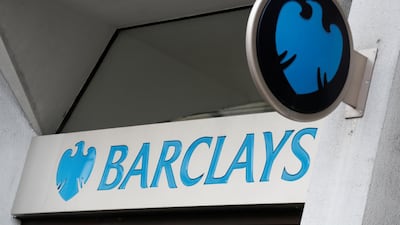The British financier Amanda Staveley has accused Barclays bank of misleading her firm over an investment deal with Qatar in a £1.6bn legal battle.
Ms Staveley’s PCP Capital Partners began a civil claim for damages in London’s High Court on Monday against the UK bank over accusations it hid the terms of its lucrative deal with Qatar during their negotiations.
Private equity firm PCP’s lawyers told the court that Barclays had agreed to provide an unsecured £2 billion (Dh9.3bn) loan to Qatari investors but “concealed” it from the market, shareholders and from PCP Capital Partners.
Joe Smouha QC, for PCP, told Mr Justice David Waksman that the claims arose out of the recapitalisation of Barclays during the financial crisis in October and November 2008.
Mr Smouha said PCP had introduced UAE investors to Barclays, who "subscribed" to invest £3.25 billion in the struggling British bank at a time when the other “strategic investors” were the State of Qatar and its prime minister, Sheikh Hamad Bin Jassim Bin Jaber Al Thani.
Mr Smouha told the court PCP had been told it had been given the same terms as the Qataris.
“The Qatari Investors, who were already shareholders in Barclays through an investment made in Barclays’ capital raising in June 2008, had agreed to invest a total of £2bn,” Mr Smouha said in a written case outline given to the judge.
“However, PCP had been induced to invest on manifestly worse terms than the Qatari Investors.”
The court heard Barclays had agreed to pay the Qatari Investors an additional fee of £280 million; a “yet further fee of £66m” and provided “an entirely unsecured loan” of £2bn.
“Barclays deliberately misled not only PCP but also its own shareholders and the market in this regard,” added Mr Smouha.
“The £280m fee was disguised as a charge for purported ‘advisory services’.
“In any event, the fact of that fee and the very short agreement concerning it was concealed from the market, shareholders and PCP.”
Barclays eventually secured £4bn from Qatar and £3.5bn from Abu Dhabi during a capital-raising operation to avoid a UK government bailout.
Mr Smouha told the court that if Barclays had not “lied” then PCP would have been able to “negotiate a better deal or at least had a substantial chance of doing so”.
“There is no doubt a deal would have been done as Barclays had to,” he said.
“It was the weakness of Barclays position because of its determination to seek private capital that forced Barclays to accede to Qatari demands for large additional fees.
“Barclay’s efforts to find other investors other than the Qataris and PCP came to nothing and it meant Barclays needed PCP and its consortium critically.”
Mr Smouha said there was a “consciousness of risk” by a large number of people at Barclays during the negotiations about “being exposed”.
“Here one sees … an appetite for risks varying from person to person,” he said.
“What is also relevant in this case however is the acute sense that what was been done was wrong, dangerous, at the very least risky and was inevitably going to be challenged if it got out later.”
He said the courts must ensure PCP is compensated for its loss.
The bank is defending the claim and says that Qatar was paid an extra £322m under the terms of two separate agreements aimed at boosting the bank’s presence in the Middle East.
PCP claims the agreements were “shams” and says it lost out on hundreds of millions of pounds.
The trial in London has been repeatedly delayed because of an eight-year criminal probe and failed prosecutions of four of the bank’s executives.
The defendants, including Middle East investment chief Roger Jenkins, were acquitted in February, clearing the way for the case brought by PCP to go ahead.


